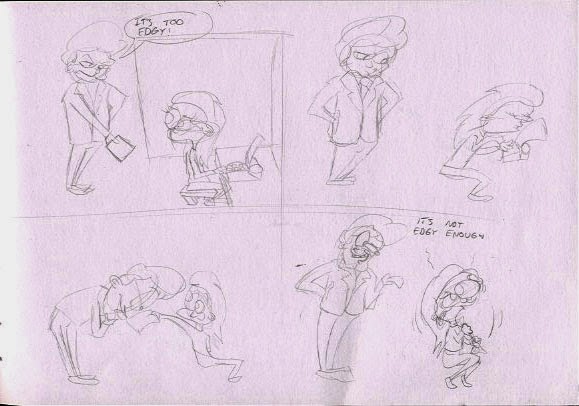I'm a little on the fence with this subject matter. Granted, I am completely against censorship of the truth, however with art I'm not 100% against censorship. On censorship of truth, there is no good excuse to me on censoring real-world problems. For example, photography depicting what is happening in third world countries, and an army battlefield being manipulated removes any validity that it ever had. This is because the images in a photograph affect the context behind it greatly. True, some photographs aren't manipulated, but images of corpses from enemy soldiers, even citizens of countries, images like that tend to be censored to maintain the view that the soldiers defending our country are heroes, so the idea that they are performing such amoral things wouldn't sit right with people. Although, I would argue that these images would only affect people's views on war, and whether it is really always an ethical way of solving our problems, but no screw thinking about things, let's just lead on that war is right by hiding the truth from people. So you'd think it was just the negative truth being censored right? It actually goes both ways.
Remember the Haiti earthquake from 2010? The news reports covered basically enough (or at least as much as they could) to get an idea of how bad it was for the time, but after a while, they just started making up stories about the Haitians rioting for the aid being given to them and that it got to the point where they just started fighting over empty boxes,
as pointed out here by in Charlie Brooker's Newswipe. You can clearly see in the news footage that the Haitians were playfully slamming and chucking the boxes to each other, essentially making the best of the situation they're in. Not only that but they
conveniently have no visual evidence of their claims that they're brandishing weapons at each other; they even admit this but follow it up with "it almost doesn't matter" (Yes, lady. Yes it does). I can think of two reasons they would make such bizarre claims like this. Either they needed more viewers and had to tell a more "interesting" version of what was happening to grab more of an audience, or they thought people were losing interest in these events so they had to make up some more negative news about Haiti. I feel like the former is more likely, but I mentioned the latter since it would seem like the fake news reports had the best intentions, but I still find that unethical because lies are still lies, and the ends don't justify the means.
What about censorship of art though? Am I against that? Well... It depends. Some aspects of art may be deemed inappropriate depending on how well it translates to different cultures, and rightly so. Pokemon had that very notorious episode that caused literally hundreds of children to have seizures, so it's no wonder it was banned and was refused to air in different countries. I can't exactly say the same for the way they used to treat moments in the show where they would reference Japanese culture, such as the characters clearly eating rice balls but being called "sandwiches" or "donuts". It used to happen a lot with localised kid's anime, in which 4kids, the company behind the American dubs of anime, would pretend they weren't made in Japan to be more appealing to kid's audiences. I guess they thought a culture shock would be too off-putting for younger viewers. It also used to happen in video games during the 90s when they were being released outside of Japan, Nintendo or Sega of America would make changes to the graphics in order to be appropriate. Final Fantasy VI (among pretty much every other Japanese RPG at the time) would have towns with Bars or Pubs in them, but were changed to Cafes by merely changing the text on the signs!

Trust me, inside it looks just like a bar, nothing like a cafe.
Not only this but stuff like religious references, such as spells called "Holy" or random crosses or something like that, were taking out as well. I think this just shows that the MPAA and BBFC tend to focus on how children's parents respond to material relating to alcohol, tobacco, and other stuff that you'll find in Japanese children's programming and gaming. They are afraid of annoying parents because they'll switch off the TV if they don't like what their children are watching. If you ask me though, that's more of a problem with the parents being too overprotective of their kids, and no TV show, film, or video game should suffer because of their negligence. It's no wonder children's entertainment acts like it has a gun to its head all the time.
Censorship is a rough subject. No matter what intentions people have, there will always be some dominant power that doesn't see it their way and will decide to censor it because of it. Whether the intention is to entertain people or to give people the harsh truth about the real world, someone with enough power to alter how the message is told by changing its connotations will end up getting their hands on it. Some people can't handle the harsh truth though, but it's unfortunately wrong to omit the truth no matter how bad it makes them feel. Would you rather your doctor give it to you straight or let you suffer without you realising it? That's my philosophy. With censorship of entertainment, I'm against censorship of that unless it's something that can genuinely harm people, otherwise, don't touch something that's not yours.







